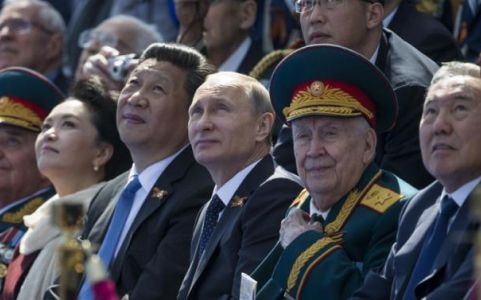China's military parade in Russia: The focus of international observers
China has had its leaders and military attend the parade celebrating the 70th anniversary of the victory over Fascism in Russia, attracting special attention.
According to CSM magazine, both China and Russia share common interests and visions on many issues in the world. However, will Xi Jinping's visit to Russia bring what Russian President Putin expects?
 |
| Chinese President Xi Jinping and Russian President Putin attend the military parade on Red Square (Photo: AFP) |
Warm?
As Russian President Putin and Chinese President Xi Jinping stood side by side on the rostrum in Red Square to attend the military parade marking the 70th anniversary of Russia's victory over Nazi Germany, the two leaders shared smiles and warm handshakes.
The Chinese President's attendance at the ceremony is a great encouragement for Russia, given that many Western leaders were absent from this important event.
However, the appearance of Mr. Xi Jinping did not bring what Mr. Putin wanted most, which was that Russia and China would unite against the West.
With relations between Russia and the West at their lowest point since the Cold War, Putin obviously wants China to support Russia in confronting the US, said Sergey Lukonin, a China expert at the Institute of International Relations and Global Economics.
However, for Beijing, which is only interested in Russia's commercial interests and oil and gas resources, this may be “an expectation that is difficult to meet immediately”.
Mr. Li Xing, Lecturer of International Relations at Peking University, commented: “The Russia-China relationship is not a military and political alliance aimed at any third party. China's alliance with Russia is not against any country but only for national interests.”
However, many Chinese officials assert that the Russia-China relationship is very warm and that Russian President Putin and Chinese President Xi Jinping are also very close to each other. Both China and Russia are doing their best to strengthen their strategic partnership.
Common interests
Russia and China share many common interests. Russia is China’s second-largest supplier of equipment and its third-largest source of gas and oil.
The Russian and Chinese navies will conduct their first joint exercise in the Mediterranean Sea at the end of May.
In addition, the two countries are also members of the BRICS group of emerging economies and share many common concerns, including dissatisfaction with the US's involvement in too many global affairs.
However, Mr. David Zweig, a lecturer on China relations at the University of Hong Kong, commented that during the crisis in Ukraine, Beijing has been very careful not to unnecessarily complicate its relationship with Washington while not displeasing Moscow.
“They don’t support the Russian position, but they don’t challenge it either,” Mr. Zweig pointed out. Beijing has tried to stay out of the diplomatic battle and the sanctions imposed by Russia, the United States, and the EU on each other.
“China has always been willing to create relationships for its own strategic benefit with Russia to appear closer to Russia than it actually is in the hope that the US and the West will be wary,” said Michael Swaine, a China analyst at the Carnegie Endowment for International Peace.
“Meanwhile, Beijing does not consider Russia a truly important and strategic partner,” Mr. Swaine added.
Behind those friendly smiles, many Chinese businesses once "bargained every penny" to buy Russian gas and oil, only to be "displeased" when oil prices dropped dramatically.
“The Russia-China trade relationship is based on market principles. Russia and China have different interests and Chinese companies have always been independent of the government,” said Li Ziguo, an analyst on Russia relations at the China Institute of International Studies.
In September 2014, Russian President Putin called on Chinese businesses to invest in Russia's largest oil field, Vankor, managed by Rosneft.
“In general, we are very cautious in calling for investment from foreign partners, but with our Chinese friends we do not set any limits,” Mr. Putin affirmed.
However, so far, neither Rosneft nor China National Petroleum Corporation (CNPC) has signed any agreement.
Energy, however, is still seen as the most important pillar in the Russia-China relationship. A recent BP report predicted that by 2035, Russia will be the world’s largest oil exporter and China the world’s largest oil importer.
“Russia is looking to export to the Asian market and cooperation with China is being carried out with specific projects and calculations. The Russia-China relationship is a relationship of intertwined interests and competition and is far from ideal,” said Dmitry Orlov.
That competition is most evident in Central Asia, where Beijing is wooing many post-Soviet states and challenging Russia's traditional influence.
China is rolling out the “One Belt, One Road” project to help develop infrastructure connecting Asia and Europe.
Sergey Lukonin, a China expert at the Institute of International Relations and Global Economics, said that the money China spends on this project will mainly be used to hire Chinese businesses, and this shows that China is gaining a leading position in the region where Russian businesses used to be number one.
However, Russia does not have many options when doing business with China, Mr. Lukonin affirmed: “When China was a developing country, we could put pressure on them. Now we cannot do that because China has money and Russia does not”./.
According to VOV






